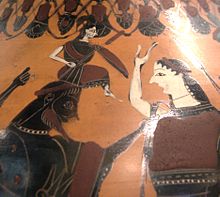Eileithyia
| Eileithyia | |
|---|---|
| Goddess of Childbirth | |

|
|
| Abode | Mount Olympus |
| Parents | Zeus and Hera |
| Siblings | Aeacus, Angelos, Aphrodite, Apollo, Ares, Artemis, Athena, Dionysus, Enyo, Ersa, Hebe, Helen of Troy, Heracles, Hermes, Minos, Pandia, Persephone, Perseus, Rhadamanthus, the Graces, the Horae, the Litae, the Muses, the Moirai |
| Roman equivalent | Lucina |
Eileithyia or Ilithyia (/ɪlᵻˈθaɪ.ə/;Greek: Εἰλείθυια; also Ἐλευθία Eleuthia, or Ἐλευθώ Eleuthō) was the Greek goddess of childbirth and midwifery.
According to some authors, her name does not have an Indo-European etymology, which for R. F. Willets strengthens her link to Minoan culture. "The links between Eileithyia, an earlier Minoan goddess, and a still earlier Neolithic prototype are, relatively, firm," he wrote. "The continuity of her cult depends upon the unchanging concept of her function. Eileithyia was the goddess of childbirth; and the divine helper of women in labour has an obvious origin in the human midwife." Additionally, for Willets, Cretan dialect 'Eleuthia' would connect Eileithyia (or perhaps the goddess "Eleutheria") to Eleusis.
19th-century scholars suggested that the name is Greek, from the verb eleutho (ἐλεύθω), "to bring," the goddess thus being The Bringer. The variants Eleuthia (Cretan) and Eleuthō (used by Pindar) suggest a possible connection with "Eleutheria" (freedom). The earliest form of the name is the Mycenaean Greek ...
Wikipedia
